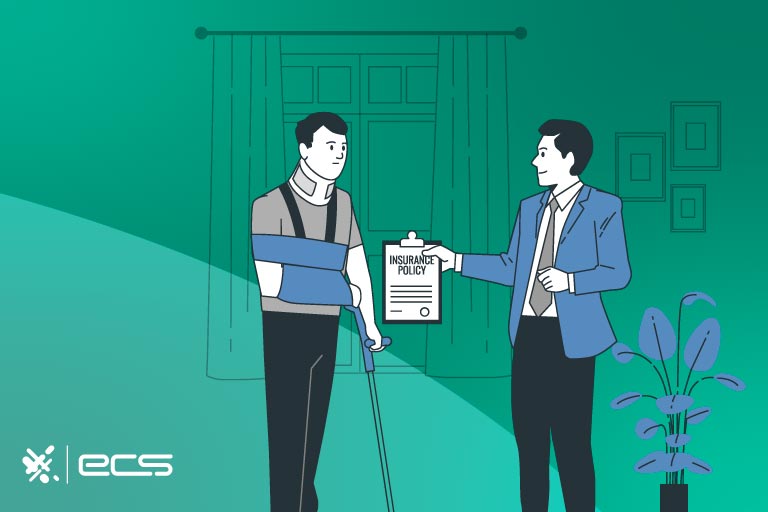Although insurance agencies are not necessarily handing out goods and services, they still need a payment gateway to accept recurring credit card processing and ACH transactions from their clients. Insurance Agencies Payment Solutions can vary. But how do you know what solution is best for you?
Insurance agencies are a type of business with a vastly different model than other businesses. In B2C settings, consumers make a purchase to get goods or services, either one time or on a recurring basis.
With insurance, they are not getting tangible goods or services. Rather, they are getting peace of mind. In the event an undesirable event occurs, their insurance coverage will defray the cost of getting life back to normal.
Is Insurance a Gamble?
Insurance itself is an interesting concept. In a way, it’s a little bit like gambling. But in contradistinction to throwing dice or rolling a roulette wheel, policyholders are hoping that specified events do not happen.
Individuals who have auto insurance aim to avoid car accidents. Homeowners with insurance hope to prevent trees from falling through their roofs. Those who possess life insurance have no desire to embark on the uncharted realm (as famously stated by Hamlet). And no, that undiscovered country is not Bangkok during Spring Break.
By the same token, insurance companies are also hoping that a specified event does not occur. If it does, they’ll have to give the policyholder a cash payout. This cash payout might be used to fix a car, repair a roof, or provide dependents to cover the cost of living expenses if their breadwinner died unexpectedly.
Risk, Reward, and Fingers Crossed
In this way, insurance companies and their policyholders (also called subscribers) are united in the common goal of not wanting an event to happen. But they are not united in the outcome. The policyholder will get paid, and the insurance company will lose the bet, so to speak. The “bet” in question is whether the odds of a certain event happening are likely or not.
Of course, insurance companies would not agree to extend a policy to something that was likely a losing proposition. That’s why life insurance companies will try to avoid insuring unhealthy people. It’s why homeowners’ policies typically don’t cover floods (because they’re usually cyclical and guaranteed to happen at some point- especially for certain terrains).
And it’s also why insurance companies charge the premiums they do charge. If the risk of something happening increases, the insurance company needs to collect more money to lower its risk. If you drive a red sports car and have several traffic violations on your record, your car insurance agency is going to charge you more money for car insurance.

Insurance Agencies Payment Solutions Facilitates Cash Flow
All of this means that insurance agencies need a way to collect payments on a recurring basis. Generally speaking, if cash flow isn’t in place, insurance companies don’t have the money they need to operate and pay out claims. Incidentally, this is why insurance companies also need to have cash reserves that range from 8% to 12% of their anticipated claims.
So now we come to agent payment solutions. As mentioned, payment processing for insurance companies is all about collecting recurring payments. Recurring payments require the business in question to collect credit card or debit card info, in this case from subscribers. Typically, payment gateways will ask the customer to input their credit card number, expiration date, CVV code, and billing address.
The business will run a charge with that card information whenever the pre-agreed day arrives. For most types of insurance, this is a certain day of the month, every month. Their merchant services provider can actually automate the recurring billing, so the insurance agent or company does not need to do anything.
If for some reason the payment bounces, such as the subscriber having insufficient funds, the credit card processing company can send a notification to their merchant account (the insurer). The insurance company can then contact the client to make a payment for the policy so the coverage can continue.
Insurance Agencies Payment Solutions Automates the Business
The entirety of this business process is extremely seamless and hands-off. And that of course, is the idea. A virtual terminal like an online payment gateway will give the subscriber some payment options: Visa, Mastercard, Discover, Amex, or ACH (more on that later). Moving forward, the customer will have their premiums automatically changed, every month.
The automation of this business model is why many insurance agents get into insurance sales in the first place. Subscribers will stay with an insurance company for years. For one, there is often little incentive to switch providers.
Some types of insurance also have longer terms than others. Life insurance, for instance, comes in 5, 10, 15, 30, and lifetime plan options. By contrast, car insurance is typically reassessed on an annual basis.
Customers will switch insurance providers if they feel that they are overpaying. To this end, insurance companies do tend to engage in marketing tactics where they poach subscribers from other agencies. For this reason, it’s always a good idea to defend your cash flow by staying in touch with your customers, even if they are already subscribers.
Subscribers Want to Go On Autopilot
But in any case, recurring payments put insurance agency cash flow on autopilot. And a credit card processing solution is at the core of that cash flow. You can indeed give subscribers the option of paying their bill as it comes in. However, this requires the client to get on the phone or go online and proactively make a payment.
With all the different bills people have to pay, they may forget to do this, interrupting your cash flow. For this reason, it’s a good idea to present automated payments when enrolling subscribers in coverage. Most consumers will be happy to have their insurance put on autopilot since it’s one less thing to worry about.
For instance, most subscribers would be happy to pay life insurance with a credit card one time and then not have to do it again, ever. However, as we will see (with ACH payments) insurance pay with a checking account is probably the best form of autopilot payments.
The same is true for car insurance payments. Think of yourself in terms of having to pay your car insurance. Would you prefer to have to pay it monthly (risking a missed payment as well), or would you rather have it done for you automatically?
Sometimes consumers like to pay for things with cash, but this is not possible with insurance premiums. Sending cash through the mail is ill-advised as it is untraceable. So an all-cash insurance agency is out of the question. Credit, debit, and ACH payments it is, then. But keeping this information for future payments will require storing it.
Storing Credit Card Data and PCI Compliance
It’s important to know that saving sensitive information carries some legal requirements. Payment Card Industry Data Security Standards were created to make sure organizations are securely storing financial information like credit card numbers.
The details of PCI compliance (as it’s called) are complex and numerous. It’s expensive to set up protocols and maintain them. For instance, a PCI audit alone can cost around $15,000. Large Fortune 500 companies can afford to set up and service this kind of infrastructure, but smaller companies cannot.
If you have a small insurance agency or if you are even just one broker, you will need to outsource PCI compliance to a third party. Some agents and agencies are fortunate to work as field sales reps for umbrella organizations. These agents can direct subscribers to go to payment portals set up by Allstate, MetLife, AAA, or whatever company they represent.
But smaller agencies, particularly brokers, may be providing their own policies, or policies that they’ve repackaged directly to their subscribers. As such, they will need to take payment from clients through their own payment portal. And that means staying PCI compliant. As mentioned, this is a huge headache and financial burden.
That’s why these agencies, agents, and brokers need to have a payment processing system for insurance companies. The payment processor will be able to shoulder the cost of PCI compliance and build that cost into their processing fees. Meanwhile, the insurance broker themselves will not have to store or manage any of the customer payment information.
Insurance Agencies Payment Solutions Can Also Prevent Fraud
In a similar vein, payment processors can also set up anti-fraud measures. These days, it is possible that an agent or broker will have a significant number of clients they have never met in person. While one may want to assume that people are generally honest, there may be subscribers who are using stolen credit card information to make payments.
Payment processors can use the latest technology, in partnership with card networks (like Visa and Mastercard) to prevent fraud. Some of this technology is complex, such as proxy piercing. To make a long story short, this type of technology locks down the IP address of the computer or device used to make a payment. In some cases, it can even determine the physical address.
If a payment location does not line up with information about the cardholder, this red flag can block the payment. For instance, an American subscriber paying from a different country is a red flag about some potential scamming in the works. Conducting due diligence like this can be time-consuming, and in fact, impossible for individual agents, brokers, and small agencies.

Using ACH Payments for Insurance Premiums
An alternative to using a debit card or credit card for insurance payments is the ACH withdrawal. ACH stands for Automated Clearing House Network. This network is a partnership of thousands of banks and financial institutions around the United States. NACHA, or the National Clearing House Association, is not a government agency, but rather a partnership of private and public sector entities that participate in ACH transfers.
ACH transfers use checking accounts and routing numbers to send and receive payments. The sending of these payments is conducted by NATCHA operators, who send them in batches throughout the day. Generally speaking, these payments take about 24-48 hours to fully settle, but in recent years same-day ACH has developed and facilitated quicker payments.
Benefits of Using ACH Payment Solutions
ACH payments have several benefits. Since they don’t involve passing anything through card networks, they can avoid card network interchange and assessment fees. As such, the average cost of an ACH transaction is around $0.29 per payment.
For insurance companies, this can result in a lot of savings. For one, each premium will only cost the agent or agency three dimes to collect, instead of several dollars. Multiplied against hundreds or thousands or tens of thousands of subscribers, this can snowball into significant savings. Typical interchange fees are up to 2.5% (for Visa), up to 2.6% (for Mastercard), up to 2.5% (for Discover), and up to 3.4% (for American Express).
Another benefit to having subscribers pay for insurance with a bank account is that bank account numbers are permanent. Subscribers paying for insurance with a credit card could lose the card. The card could expire. The card could get stolen. All these things will disrupt cash flow once the card number changes.
The customer may even use this moment to reassess whether or not they want to keep paying for your policy, which would be bad for you, the agent. To prevent this kind of disruption, ACH payments are a good solution. You can encourage your subscribers to pay their insurance with a checking account by offering a discount. At the very least, you will want to present it as an option alongside paying for insurance with a credit card or debit card.
What Happens to Cards That Expire
Incidentally, the fact that cards do expire is yet another reason to work with a good insurance payment company. The payment processor may be set up to remind you of when customer cards are about to expire since they save this information.
But wait…it gets even better. In most cases, they will be able to continue to run charges on the card even after the expiration date. Check with your payment processor to see if they offer this kind of continuity.
Debit, Credit, Card Present, Card Not Present…
You may have heard that credit card transactions cost more money than debit card transactions. This is sometimes true, especially if a debit transaction involves the input of a PIN. In most states, you are allowed to defray additional credit card costs by telling subscribers they will pay an extra convenience fee for using credit instead of debit. However, this kind of verbiage can sometimes create a negative customer experience.
Another related concern is whether a transaction is card-present or card-not-present (CNP). As you can imagine, CNP transactions are more easily subjected to fraud. The thing is, all your subscribers who sign up for a policy over the phone or by making a payment online, are doing CNP transactions, which will cost you more.
Is there any way around this? Somewhat. If you meet with clients in person, or have them come to an office, you can have them make their first payment in person. If you have a brick-and-mortar office, you may want a POS terminal in the office for collecting such payments. And if you are on the go, meeting subscribers in person elsewhere, a mobile terminal can help you collect payments.
Lump Sum Discounts, Face-to-Face Sales, and QR Codes
On the topic of collecting payment, some insurance agencies find it helpful to offer discounts to subscribers who pay for a year in one lump sum. You can use this to your advantage to collect payments up front, in person, if you are selling face-to-face. The payment can be conducted at a terminal as a card-present transaction, and you will secure an annual cash flow from that particular subscriber.
On the topic of face-to-face sales, QR codes are an interesting development. These are checkerboard squares you could place on a business card. After meeting with a potential subscriber, you can have them scan the pattern with their smartphone. They will then be prompted to a payment gateway, where they can make their first payment.
Concluding a meeting this way locks a potential customer into a subscription and completes the sale. Keep in mind, however, that because QR codes direct a subscriber to a web portal, it is essentially a card-not-present transaction, and you will be charged accordingly. This is true even if the subscriber is sitting right in front of you.
Insurance Agencies Payment Solutions Can Also Facilitate Payouts
Another unique consideration for insurance payment processing is payouts. While you are certainly hoping that you don’t have to make a payout, there are times when it will happen. Typically, insurance companies will issue a paper check.
This is especially true in some states for car insurance. Drivers will visit an appraisal location, and if the appraiser determines that the driver was wrongfully hit, may cut the driver a check for repairs.
Other types of insurance companies (homeowners, life, specific forms of property insurance) may also resort to using paper checks. While you are not going to be writing out checks all the time, check payouts will probably cost you at least $20 or more, per check. This number covers the cost of issuing the check and all the backend processes behind it.
By contrast, your payment processor could facilitate ACH deposits that will cost significantly less. Additionally, they will happen much more rapidly than a paper check sent through the mail. This will create a much better client experience for your subscriber. If it takes them too long to receive their payout, they may choose to switch to a different insurance carrier.
Special Considerations for Life Insurance Agencies
A life insurance merchant bears special mention. This is because some forms of life insurance are combined with other financial products. Whole universal life insurance, for instance, may involve allocating a portion of the premium to a savings account in the name of the subscriber.
As this arrangement is a little more complex than depositing the premium into one business account (that of the agency) a payment processor can facilitate a splitting of the payment. The premium can be delivered to your agency, and contributions above and beyond the premium can be allocated to the subscriber’s savings account—or whatever portion of the premium is allocated for this purpose.
Conducting these kinds of splits on the back end can be time-consuming and involve lots of accounting and reconciling. For instance, having all the premiums deposited into one account, and then splitting off money into fiduciary accounts for subscribers, is a manual process. Automating this process to happen immediately from the get-go is something insurance payment solutions can assist with.

Payment Solutions for Insurance Remittance
Another type of insurance that bears special mention is health insurance. Due to the complex landscape of health insurance premiums in the domestic market, insurance companies may occasionally need to send money back to hospitals, healthcare providers, and subscribers.
When sent to hospitals or healthcare providers, this is often called remittance. And when sent to subscribers, it is often referred to as an EOB or explanation of benefits. Either way, this is often determined only after the medical billing process is done.
A health insurance agency selling its own insurance or repackaged plan will need a credit card processing agent that can also handle remittance and EOB checks (explanation of benefits) sent to clients who overpaid. An insurance remittance processing system can cut out some of the manual work of cutting checks and mailing them.
And as mentioned above, the rapidity of remitting funds can vastly improve the customer experience. A payment processor that’s best for insurance agents will also have a remittance processing system for insurance companies—not just a way of collecting payments.
Pricing Schemes Don’t Work: Flat Fees
It’s important for an insurance agent, agency, or broker to work with a payment processor that is transparent and available to answer questions. Some large payment processors offer pricing structures that are particularly not beneficial to insurance companies- though they may work for small businesses with little to no credit card sales.
One such example is flat rate pricing, which is typical of companies like Square and PayPal. In this scheme, everything will be at the same rate. There may be some tiers and brackets for larger transaction volumes, but there is no difference between a Visa debit charge and an Amex credit card charge, for instance.
Even though a debit card charge may be significantly less than a credit card charge (especially American Express), the payment processor will still charge the same flat fee. Although it seems easier on paper (and it is simpler) it can ultimately end up costing you lots of money.
Pricing Schemes Don’t Work: Tiered Pricing
Another disadvantageous pricing scheme is tiered pricing. In this pricing model, the payment processor will categorize cards into different tiers. Qualified cards are typically debit cards. Mid-qualified cards are often rewards credit cards. And non-qualified cards are card-not-present transactions and corporate credit cards.
This is particularly disadvantageous for insurance payment services because most of your subscribers will be making CNP transactions. If you have B2B clients, they’ll be paying with a corporate credit card. And since these transactions are non-qualified, they’ll cost you the most money. To make matters worse, the payment processor may change the definitions of the tiers and their respective rates.
A good payment processor will offer you a plan that first with your business. In this case, something like interchange-plus pricing may be to your benefit. In this scheme, you are charged what Visa, Mastercard, and other card networks charge you, plus a markup for the payment processor.
A Good Payment Processor for Insurance Agencies
And of course, a payment processor’s customer support will be available to answer your questions. That’s something large payment processors like Square and PayPal cannot promise. Think about your own subscribers. Don’t you think they’d like to be able to pick up the phone and ask you what they want to know about how insurance works? The underwriting, the payouts, the discounts, the way policies work?
Working with a good payment processor to accept credit cards and ACH transactions can save you a lot of time and headaches, so you can focus on sales and other insurance agency processes. Building up a passive cash flow is one of the biggest parts of an insurance business. If you can unload backend concerns to third parties, you’ll be significantly poised to increase your subscriber and policyholder base.
You can skip calling a payment processing broker and speak to us directly. We can answer questions about pricing schemes, software, hardware, and integrations with accounting and invoicing software. Give us a call or fill out the contact form below to learn more.
